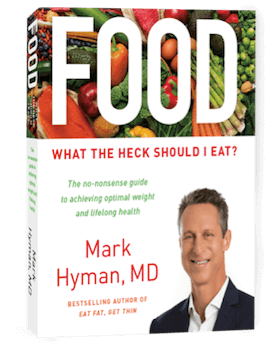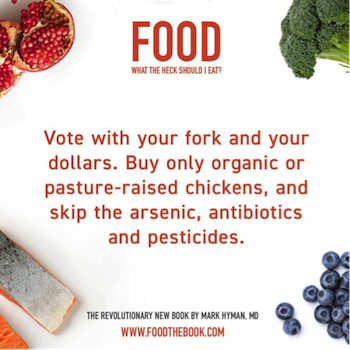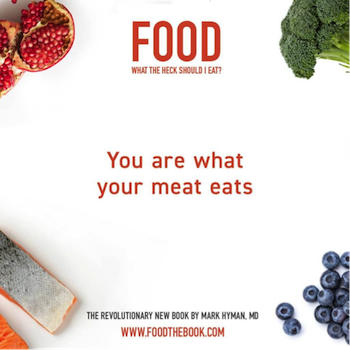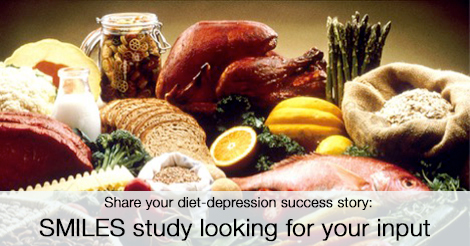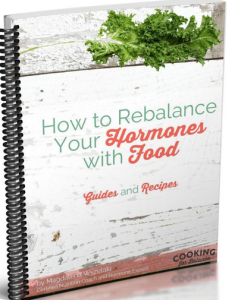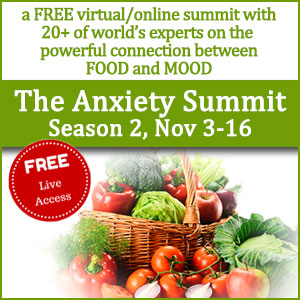I highly recommend Dr. Mark Hyman’s new book Food: What the Heck Should I Eat if you are new to the world of nutrition and functional medicine.
I will be recommending it to my newbie clients who are switching from the SAD/standard American diet (that makes you sad and mad!) to a real whole foods quality diet.
This book is well worth reading to get current trends and research
This book is well worth reading if:
-
you’re still on the fence about grass-fed red meat and eggs and still believe chicken is healthier than red meat
-
you are not current on the sugar-is-bad and fat-is-good research when it comes to cholesterol and heart disease
Consuming lots of natural, whole food-based, healthy fats, including saturated fats, is absolutely critical for good health
-
you’re not convinced that eating only organic chicken is a must and don’t know about the chicken-arsenic issue
Why would anyone feed arsenic to a chicken? Because it makes the birds gain weight faster, turns their flesh a little rosier, and kills parasites. Unless the poultry you buy is labeled organic, it almost certainly has been treated with arsenic. Of course, the arsenic the birds are fed doesn’t kill them it’s the organic kind, which is harmless. But once they eat it, it can be converted in the chicken’s digestive tract to the inorganic kind, which the World Health Organization classifies as a carcinogen.
-
you appreciate a research-based approach from a functional medicine doctor who has been doing this work for 20+ years
-
you are looking for a short overview of the benefits of a ketogenic diet and intermittent fasting, plus confirmation that coconut oil is actually healthy
-
you need a re-fresher on which additives to avoid and why – like calcium propionate, an additive in almost all commercial bread products and has been shown to cause autistic behavior in rats and in kids
It’s enough to make you wonder if there’s a link between the 133 pounds of flour consumed by each American each year and the rising rate of brain disorders such as ADHD, autism, depression, [anxiety] and more.
-
you are interested in the social and environmental aspects like: how much water it takes to produce 2 liters of soda (it’s about 132 gallons); and how we only absorb 10% of the Splenda/sucralose we consume with the rest ending up polluting waterways
- you don’t know about the superior nutritional qualities of wild or heirloom varieties of vegetables and fruit
A wild crabapple, for example, has one hundred times more cancer and inflammation-fighting anthocyanins than the Golden Delicious variety found in supermarkets. Purple carrots contain twenty times more phytonutrients than their more common orange brethren. Wild blueberries have dozens of times more phytonutrients than domesticated berries.
-
you are behind in some of the news stories like skittles and other junk-food being fed to conventional feedlot cows:
In January 2017, a flatbed pickup truck accidentally spilled its cargo on a Wisconsin highway, creating a remarkable scene. The truck, destined for a factory farm, was carrying hundreds of thousands of red Skittles to be used as feed for cattle. The spill left a blanket of red candies scattered across the road, but what was most disturbing about the accident was that it revealed a little-known fact about factory farming: that it’s not only legal but common for producers to feed their cattle all sorts of sugar, candy, Kool-Aid powder, potato chips, and molasses.
What if you’re health savvy and are already following a real whole foods diet?
You may also wonder if this book is worth a read if you are health savvy and are already following a real whole foods diet. Here are some reasons why it’s well worth getting a copy:
-
It’s a great introduction for a loved one or friend who may be new to all this
-
It’s a great gift for your doctor who may not yet be fully on board with this approach
-
It’s great to take to school administrators so you can help effect changes in your kid’s or grandkid’s schools (and even universities)
-
It’s also a great resource for sharing with food banks, drug treatment/rehab centers, and non-profits that offer food and/or meals
Other dietary resources you may need based on your unique health issues
This book does a brilliant job of covering everything you need to know about eating a quality real whole foods diet where food-is-your-medicine. But if you have certain health issues, you’ll need other very specific dietary resources (which Dr. Hyman doesn’t mention), such as a low oxalate diet, low histamine diet, low salicylate diet, diets for SIBO (small intestinal bacteria overgrowth), an anti-candida diet, an autoimmune diet and so on.
The official book blurb
#1 New York Times bestselling author Dr. Mark Hyman sorts through the conflicting research on food to give us the skinny on what to eat.
Did you know that eating oatmeal actually isn’t a healthy way to start the day? That milk doesn’t build bones, and eggs aren’t the devil?
Even the most health conscious among us have a hard time figuring out what to eat in order to lose weight, stay fit, and improve our health. And who can blame us? When it comes to diet, there’s so much changing and conflicting information flying around that it’s impossible to know where to look for sound advice. And decades of misguided “common sense,” food-industry lobbying, bad science, and corrupt food polices and guidelines have only deepened our crisis of nutritional confusion, leaving us overwhelmed and anxious when we head to the grocery store.
Thankfully, bestselling author Dr. Mark Hyman is here to set the record straight. In Food: What the Heck Should I Eat? — his most comprehensive book yet — he takes a close look at every food group and explains what we’ve gotten wrong, revealing which foods nurture our health and which pose a threat. From grains to legumes, meat to dairy, fats to artificial sweeteners, and beyond, Dr. Hyman debunks misconceptions and breaks down the fascinating science in his signature accessible style. He also explains food’s role as powerful medicine capable of reversing chronic disease and shows how our food system and policies impact the environment, the economy, social justice, and personal health, painting a holistic picture of growing, cooking, and eating food in ways that nourish our bodies and the earth while creating a healthy society.
With myth-busting insights, easy-to-understand science, and delicious, wholesome recipes, Food: What the Heck Should I Eat? is a no-nonsense guide to achieving optimal weight and lifelong health [I would also add …and for providing the foundation for excellent mental health with freedom from anxiety.]
Grab your copy from your nearest bookstore or online from Amazon (my affiliate link) and find out more here.
Dr. Hyman makes this promise:
If you take the time to read through each section … not only will you walk away with new information, but you’ll also let go of the anxiety and worry that most people have around the basic question, “What the heck should I eat?”
Feel free to comment or post questions below and please do let us know what you think of the book.
